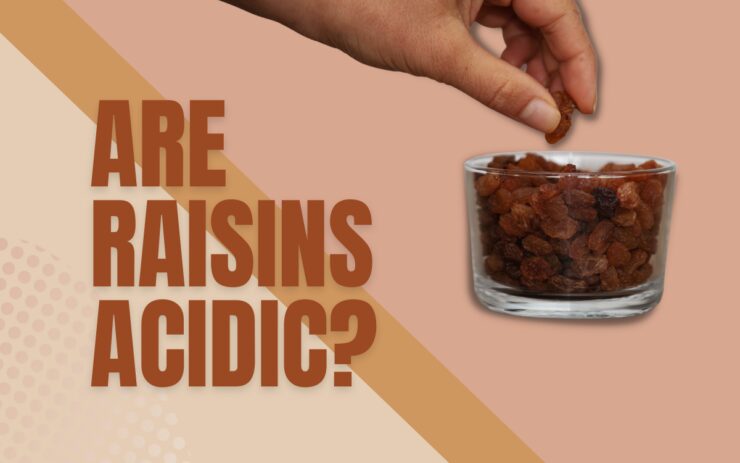Grapes are certainly a refreshing and delicious snack during hot summer days that is highly popular and enjoyed by many people. There are many different types and flavors, making them a highly versatile food. However, many people wonder – are grapes acidic? It is a highly important question, especially for people with acid reflux issues.
We did some digging and found answers regarding this topic we would like to share with you in this article. If you are in a hurry, we are going to answer you right now – grapes are highly acidic fruit and are not recommended for people with heartburn or acid reflux. However, they do offer some benefits, so we are going to inspect both sides of the story in this article. If you want to find out more, read on, there is plenty to cover.
Contents
Is This Fruit Acidic? What Is the pH of Grapes?
Indeed it is a very acidic fruit. Grapes’ pH value ranges between 1.9 and 4, making it highly acidic since everything on a pH scale below the value of 7 is considered acidic, and everything above is alkaline. The lower the value gets, the more acidic the food is.
Grapes are very high in citric, tartaric, and malic acids, making them a poor choice for anyone that suffers from acid reflux and heartburn, as they can aggravate the symptoms. No matter how you consume grapes, they can trigger acid reflux. The bottom line is whether you consume grapes raw, in wine, or in juice, the results will be pretty much the same.
However, if you consume grape products in moderation, they can be, at times, good for acid reflux. Studies have shown that once consumed, grapes can raise blood alkalinity, meaning that they can have the opposite effect on acid.
Health Benefits of Grapes
When you limit your intake of grapes, it can actually deliver various benefits for health and overall well-being. It is essential to limit your intake of acidic foods regardless of whether you have acid reflux or heartburn.
Grapes are still a very healthy fruit, and even if you have acid reflux, moderate consumption may deliver you some benefits.
For starters, grapes are rich in essential vitamins and nutrients. They are especially rich in vitamins K and C. Vitamin K is excellent because it is fat-soluble and can prevent blood from clotting, while it also aids in keeping your bones healthy.
On the other hand, you have vitamin C that benefits your connective tissue and keeps it healthy. Grapes are rich in antioxidants that can help repair damage caused by oxidative stress, which can lead to diseases such as diabetes, heart disease, and even cancer.
Grapes also possess a healthy dose of potassium which is highly important for managing heart health. Some studies have shown that eating a cup of grapes regularly can lower blood pressure and cholesterol.
Is Grape Wine Acidic?
Although indulging in some wine is something that many people enjoy after a long day, they need to know that wine is indeed acidic. Alcohol alone can be acidic, and when you add the fact that it is made from grapes, you get yourself one acidic bomb in the belly. The pH of wine is similar to raw grapes, and it ranges between the value of 3 and 4.
PRAL Value of Grapes
PRAL refers to Potential Renal Acid Load. It is the estimated potential acid load on the body for every 100 grams of the food. Essentially, the higher a food’s PRAL value, the more acid your body produces when digesting it.
Grapes have a negative PRAL value, so your body will not produce excess acid after ingesting them. Instead, your body pH becomes more alkaline, which is a great piece of news if you cannot resist this fruit.
Generally speaking, foods with high protein content, such as meat, poultry, cheese, and eggs, have a higher PRAL value and cause the body to produce more acid, whereas fruits and vegetables have a lower or negative PRAL.
Although grapes are highly acidic fruits with a pH between 1.9 and 4 when consumed, they enhance alkalinity after digestion, so if you consume this fruit moderately, it might actually help with acid reflux.
Grapes and GERD
If you suffer from GERD, eating large amounts of grapes will trigger or aggravate symptoms. Eating very small amounts may be harmless, but you should stay away from sourer varieties as they have a higher acid content. Consume grapes in moderation and closely observe how your body reacts.
Another way to consume grapes on the safer side is to eat them as a part of a balanced meal. For example, you can mix them with melons, bananas, yogurt, vegetables, and beans. This way, you will balance the stomach’s acid and maintain neutral pH levels in your body.
Are Raisins Acidic?
Raisins are indeed acidic, with a pH ranging between 3.8 and 4.1, so they do not differ much from raw grapes in terms of acidity. However, despite their acidic nature, raisins have a low PRAL value once ingested. Their pH switches to 8.5, making them an alkaline food.
So, in case you do not have issues with heartburn, you can eat raisins regularly to increase the alkalinity of your body. Raisins also contain essential minerals, including copper, iron, magnesium, and potassium, and these can help manage acidity levels in the stomach.
Raisins also contain plenty of fiber, which plays a huge role in digestion and liquid absorption in the stomach. A half-cup of raisins offers 3.3 grams of fiber and can fulfill between 10 and 24 percent of your daily fiber needs.
Grapes Are Good for Type 2 Diabetes Control
Studies have shown that consuming whole grapes can reduce the likelihood of developing type 2 diabetes. Grapes are significantly associated with a reduced risk of developing this condition in a long-term study of over 190.000 healthy individuals.
Anthocyanin and flavonoids with antioxidant properties found in grapes can keep blood sugar under control.
Final Words
Although they are acidic food, grapes offer a wide variety of health benefits, and certain types can actually benefit people with acid reflux as their pH value goes up to 8.5 when consumed.
Make sure to limit the consumption of these highly acidic fruits because when eaten in moderation, they can benefit your health and overall well-being, while overeating can lead to acid reflux, heartburn, and GERD symptoms.

Steve is a certified trainer with more than 10 years of training experience and he holds a Master’s in Sports Science. Prior to Boston Rock Gym, Steve worked for two years as a personal trainer.





